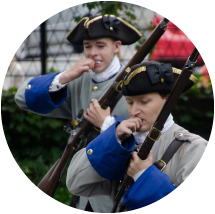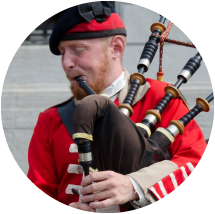our history…
WHO ARE WE?
THE OBJECTIVES
of the Anciennes troupes militaires de Montréal

To promote, organize and supervise activities to promote knowledge about the history of the Compagnies franches de la Marine in New France and the historic impact these military personnel had on Canadian and Québec societies.

To incorporate all parties interested in the history of the Compagnies franches de la Marine in New France and the historic impact these military personnel had on Canadian and Québec societies.

To maintain a program of historical reenactment for the Compagnies franches de la Marine in New France and all military personnel from that time period.

To promote and support the enrichment of historical knowledge of the Compagnies franches de la Marine in New France and the historic impact these military personnel had on Canadian and Québec societies.

To disseminate all advances made in historical research on the history of the Compagnies franches de la Marine in New France and the legacy military personnel from that time period had on Canadian and Québec societies.

Receiving philanthropic gifts, legacies and other similar contributions in money, securities or real estate ; administering these legacies and contributions, and organizing fundraising activities and fundraising campaigns to raise funds for charitable purposes.

To offer and provide services of any kind in connection with the mission of the corporation.
A story that connects us.

DE LA MARINE
Following their arrival, the troops took part in all subsequent battles and skirmishes until the French withdrawal from North America. From the early 18th century, the majority of Compagnies franches officers were composed of “Canadians” from the families of the landed nobility. The Le Moyne, de la Chenaye, Repentigny and La Vérendrye, among others.
Soldiers were generally recruited in France and encouraged to settle in the colony at the end of their service. They lived with the inhabitants, contributing to the colony’s peopling and economy. They carried out major works in peacetime, such as the construction of the fortified wall of Montréal and the Chemin du Roy.
The soldiers had a significant demographic impact on the settlement. It is estimated they represent more than 30 per cent of the 10,000 immigrants who settled in New France between the years 1608 and 1750. These individuals can be found in 100 marriage acts from the Island of Montreal parishes, proof of their integration into colonial life. The impact of their socio-economic contribution on the colony, and the territories that would become Québec and Canada, is unsuspected and little known.

HIGHLANDERS
The Regiment was dismantled at Québec in 1763 and, like several French soldiers, approximately 400 men (officers and soldiers) chose to settle in what became the province of Québec; notably in the Charlevoix and the Bas-Saint-Laurent regions. Officers were granted manorial land tenures and established their demobilized soldiers there.
Keeping faith with the old France-Scotland Alliance, these men married the daughters of the French colonists in great numbers. They form the origins of the Scottish presence and influence in Québec and Montréal societies.
